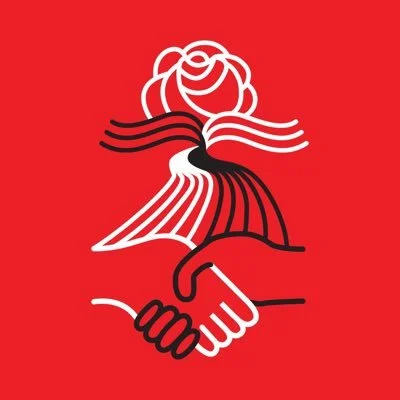

Get Up, Get Excited, Get Organized with MADSA!
After an action packed September General Meeting, two important shout-outs are in order:
First, we voted to kickstart a No Appetite for Apartheid Campaign here in Madison. No Appetite for Apartheid is a DSA National campaign launched by the Palestine Solidarity Working Group to pressure grocery stores to become Apartheid Free Stores by dropping companies and products that participate in Israeli apartheid and theft of Palestinian land. The campaign is powered by a number of chapters and coalitions across the country, and the Madison Area chapter will now be engaging in that work as well! As socialists, we stand in solidarity with all those facing settler-colonialism, and as Americans it is our duty to work from within the empire to end American imperialist violence around the world. At the September General Meeting, the chapter voted overwhelmingly to reaffirm this commitment by being the force for change in our own city. We look forward to an apartheid free Madison – and we need your help to get there. To get involved in this important work, join the #palestine-solidarity channel on Slack, check the chapter calendar for upcoming No Appetite for Apartheid (NA4A) planning meetings and events, and read more about the national campaign here.
Second, we voted to charter an Electoral Working Group to formalize the work already being done by the Power Mapping Committee as we prepare for local elections and work towards a statewide electoral strategy. If electoral work is your jam, you’ll definitely want to check out an upcoming EWG meeting, help canvas our neighborhoods with your MADSA comrades, and mark your calendars for the members-only town hall with Rep. Hong on September 29. Why a town hall with Rep. Hong? Well if you haven’t heard, Francesca Hong – a MADSA member and endorsed state legislator – is running for governor! We are excited to see where this campaign goes and to working with Fran on building the democratic socialist movement in Wisconsin. To that end, we must now engage in the process of democratically deciding if and how to get involved in the gubernatorial race. The town hall will be the first step in this process, where members will have the opportunity to ask Fran any and all questions – so don’t miss out! If you’re not yet a member, join DSA today to be able to attend.
If all that isn’t enough action for you, we have so many more exciting events and opportunities to get involved in our growing movement for a better city, state, country, and world, so get your calendars out and read on for all the details.
In this newsletter:
- Thu. September 25, 6-8:00pm: Beyond the Two Party System: A Socialist Way Forward
- Sat. September 27, 10:00am-12:00pm: Coffee with Comrades!
- Sun. September 28, 11:00am-12:30pm: Wretched of the Earth Reading Group
- Mon. September 29, 6:30pm: Members-Only Town Hall with Rep. Francesca Hong
- Sat. October 4, 2-3:30pm: October New Member Orientation
- Tue. October 7, 6:30pm: Copaganda Book Talk with Author Alec Karakatsanis
- Sun. October 12, 5-9:00pm: Halloween Carnival & Queer Liberation March Fundraiser
- Wed. October 15, 6:30-8:30pm: October General Membership Meeting


Kelly Latimore | Iconography as Resistance


Statement On the Assassination of Charlie Kirk

Salt Lake DSA condemns the assassination of Charlie Kirk. Since DSA does not advocate political assassination, it was unsurprising to learn that Tyler Robinson is not associated with DSA.
We do not believe political assassinations bring us a single step closer to socialism. Instead, it creates a fearful, retributive, violent political climate which endangers workers and therefore lowers our ability to engage in activism. Charlie Kirk was a racist, sexist, white supremacist supporter of the capitalist class but workers are not convinced of socialism because of his murder.
The kind of transformative political change we need will come about when the vast majority of workers understand the nature of class society—currently dominated by capitalists and their allies in the two-party system—combined with the level of worker organization necessary to take political power from this ruling class. We do this by winning reforms which protect and advance our ability to organize: The right to live without the constant terroristic threat of deportation; to free speech without state persecution; to basic bodily autonomy and gender affirming care; to organize labor unions and bargain fairly; to affordable housing, childcare, healthcare, and education. In essence, reforms to protect workers from the systemic, daily violence of capitalism, the pursuit of profits over people’s well-being, and to show all workers the unjust nature of class society.
Trump extends his political violence on the working class in Utah and nationally with tens of billions of funding to turn ICE into an oppressive force to terrorize migrant communities and eradicate freedom of speech, while simultaneously shredding Medicaid, Medicare, and our remaining social services. Of course Trump wants to distract us from his snowballing Epstein political crisis.
Trump is using Kirk’s assassination as an excuse to crack down on our rights to organize for socialism. To be clear, the oppressors of the working class will use any excuse to do so. What matters is that Utah workers witnessing this crackdown know who their allies are in defending our Constitutional and democratic rights. That they learn, with certainty, that the capitalist class is their enemy, using the flimsiest excuses to try to crush those fighting for a better future.
We recognize that violence will continue in this society with no reasonable gun control and an unaffordable physical and mental healthcare system. Regardless, do not give in to the mindset that there are individual solutions to our social problems. Instead, grow your working class consciousness. You are not alone; together we are the working class that can create a humane, socialist society.
Our organizing will not stop. Socialism is necessary, but not guaranteed.
A better world is possible. Join Salt Lake DSA.
The post Statement On the Assassination of Charlie Kirk first appeared on Salt Lake DSA.


A Weapon of Annihilation Flies Over Montpelier
Note: posts by individual GMDSA members do not necessarily reflect the views of the broader membership or of its leadership and should not be regarded as official statements by the chapter.
GMDSA Co-Chair Joe Moore on the recent B-2 flyover. Photo Credit: Northrop Grumman/U.S. Air Force
On the afternoon of Saturday, September 20, a B-2 “Spirit” stealth bomber flew low over Montpelier on its way to Norwich University. The 2 p.m. flyover was scheduled to coincide with the kickoff of Norwich’s homecoming football game.
The B-2 is a heavy bomber designed to carry a large payload, including up to sixteen 2,400 pound B83 nuclear weapons - each one with a potential yield 80 times that of the Hiroshima bomb. At about $2 billion per plane, the B-2 is the most expensive military aircraft ever produced. In terms of both cost and destructive capacity, the F-35 pales in comparison.
I happened to be standing in the parking lot behind Montpelier’s Christ Episcopal Church when I heard the low roar of the B-2 overhead. It was a terrifying sight to behold from directly below. Its unique angular profile makes it immediately recognizable as a nuclear-capable stealth bomber. With only 19 in existence, the B-2 is a rare sight in most places, not to mention the skies over Vermont’s capital.
A deep sense of unease at finding myself directly below a weapon of mass annihilation quickly turned to anger. At that moment, I was surrounded by the tents and canopies of Montpelier’s unhoused population. Dozens of Vermonters were forced to seek refuge in the Church parking lot following the end of the state's motel housing program on July 1 and Montpelier City Council’s ongoing ban on camping in “high sensitivity areas.” The juxtaposition of the $2 billion B-2 flying low over a cluster of makeshift shelters erected on parking lot asphalt could not have been more stark.
This one plane alone could have paid for the construction of 10-20,000 additional units of housing – not to mention clinics, schools, childcare centers, and other socially useful infrastructure. At $2 billion, one B-2 represents just under one-quarter of Vermont’s entire state budget. Its presence in the skies over our communities is both an affront and a timely reminder that the existence of poverty and homelessness in America – the wealthiest county in the history of the world – is not an inevitability. It is a social choice.
While gratuitous displays of military power have become commonplace at U.S. sporting events, we should remember that those machines that inspire feelings of awe and pride in many Americans are weapons of mass destruction that inspire terror in most other places around the world. For the thousands of refugee families who have resettled in Vermont after fleeing wars abroad – including U.S.-launched wars – low-flying bombers are not associated with patriotic pageantry. They are associated with death and devastation.
Norwich University is a private military college, but its leaders should consider its responsibility to the community and region in which it is embedded. Football is enjoyable on its own. The University doesn’t need to subject Washington County residents to the presence of weapons of annihilation for the purpose of “entertainment”.

Your National Political Committee Newsletter — Amid Hard Times, Democratic Socialism Goes Mainstream
Enjoy your September National Political Committee (NPC) newsletter! Our NPC is an elected 25-person body (including two YDSA members who share a vote) which functions as the board of directors of DSA. This month, hear from the Mexican left, help stop deportation flights, and more!
And to make sure you get our newsletters in your inbox, sign up here! Each one features action alerts, upcoming events, political education, and more.
- From the National Political Committee — Amid Hard Times, Democratic Socialism Goes Mainstream
- Live from the Global Sumud Flotilla — Humanity is on Board to Stop the Genocide! Join Us Friday 9/19
- RSVP for DSA Political Exchange Call with MORENA Starting Saturday 9/20
- Spanish Speakers: Housing Justice Commission Weekly Spanish Practice Beginning Tuesday 9/23
- Sign Up for Stop Avelo Power Mapping Workshop Tuesday 9/30
- Join Our Growth and Development Committee’s Membership Drive!
- Apply to Join the Democracy Commission (DemCom) 2025–2027! Deadline Saturday 10/18
- Apply Today to Become a Discussion Forum Mod!
From the National Political Committee — Amid Hard Times, Democratic Socialism Goes Mainstream
“Freedom is always the freedom of the dissenter.” — Rosa Luxemburg
As Trump’s administration accelerates its attempted crackdown on dissent — demanding the deportation of Palestine solidarity activist Mahmoud Khalil and others, using economic threats to force TV networks to silence even mildly-critical hosts like Jimmy Kimmel, allegedly planning a broad-based “crackdown” on liberal and left wing organizations, and whatever fresh fascist schemes appear in their alphabet soup — we stand proud and firm knowing that we, as democratic socialists, are not only on the right side of history but the popular side of the present.
As democratic socialists, we are on the side of and among the people. And we’re not just saying that because it’s a cool-sounding socialist slogan — we have evidence! A new national poll from Jacobin and the DSA Fund finds that democratic socialist leaders and left-wing policies are broadly popular. More and more Americans are not just seeing what we stand for as radical — against an economic system rigged in favor of corporations and the wealthy, it’s practical!
That confirms what many of us know as DSA members. From years of knocking doors for campaigns, tabling, and talking to people in our communities about the projects we’re taking on collectively, we know from firsthand experience that working class people are hungry for an alternative and very receptive to ideas about how we make it happen. When we communicate plainly and lay out organizing plans together that people can believe in, it can powerfully cut through all the noise from a ruling class that wants to keep us divided and distracted while they plunder our planet and pick our pockets.
As DSA member Zohran Mamdani gets closer to the mayorship of the wealthiest city in the world, DSA chapters around the country are running candidates to expand socialist power on city councils and in state houses, and through our work in housing justice, labor organizing, and campaigns grounded in ecosocialism, socialist feminism, abolitionism, trans and queer liberation, and more. As we keep raising expectations and winning power with the strength of our organization, we’re reaching millions of people to see that a better world is possible — and that DSA is building the organization that they can join to build it together.
The crackdown on dissent is genuinely scary, but we won’t let it stop us. We believe in a path to socialism, even inside the belly of the beast, that comes from collective mass action — like labor and rent strikes, peaceful public protests, community-powered elections and ballot initiatives, and economic pressure campaigns like Boycott, Divestment, and Sanctions (BDS) in solidarity with Palestinians, to end our government’s support for apartheid and genocide.
When the ruling class’s greed and incompetence opens up a power vacuum, like when the New York City establishment decided to run two corrupt machine Democrats against each other, they leave a lane wide open for organized socialists to move in. DSA was ready for this moment after years of steady organizing to build an electoral bloc of Socialists in Office in New York, who aren’t there to simply advocate for bills in government and let us hope for the best from the outside — they organize with us and show up with us on the streets to stand up for justice for us all. We will continue to be ready. Keeping on with our organizing work is how we build our organizing chops, expand our base, and be ready when those moments come — which is to say, it is the most powerful thing we can do right now. We continue to march forth with things like a mobilization call to support the Global Sumud Flotilla (scroll down for info about an exciting live stream!), organize together to defend our immigrant neighbors, increase support of Starbucks worker organizing, support our nationally-endorsed electoral slate, and so much more.
We are in DSA because we believe in a better world, one in which people’s basic needs are met, where we make decisions democratically about our living and working conditions, where the violence of bigotry and division are no longer a subject of debate, but simply a thing we remember from the darker days.
This is an important time to continue bringing new people into our organization, and to motivate our members to keep building working class power together in our communities. We’re safer and stronger when we are pulling together toward our common goals. We’re about to ramp up a big fall recruitment drive — now’s a great time to make the ask of people in your life to join DSA! Dues are one of our collective resources (consider raising yours today!), our experience and skillsets as organizers are also, the power that comes from moving in unison with hundreds and thousands of people is another… and courage is too. Pool that courage together and we will not fail.
Solidarity Now and Always,
Megan Romer and Ashik Siddique
DSA National Co-Chairs
Live from the Global Sumud Flotilla — Humanity is on Board to Stop the Genocide! Join Us Friday 9/19
The DSA International Committee will be hosting an important conversation with some of our global movement partners, livestreamed directly from the decks of the Family, one of the ships on the Global Sumud Flotilla, in order to find out more about the goals and strategies of the Flotilla itself, as well as to help build a solidarity network for Flotilla participants, who are being actively targeted by the Zionist state for their humanitarian work.
Come join us tomorrow, Saturday 9/19 at 12pm ET/11am CT/10am MT/9am PT to hear first hand about what is going on with the Flotilla, and to share ideas about how to continue to strengthen international solidarity against the genocide in Gaza and in support of Palestinian liberation. DSA members in good standing are invited to register here.
RSVP for DSA Political Exchange Call with MORENA Starting Saturday 9/20
Saturday 9/20 and 9/27, we’ll be participating in our first ever political exchange with the Mexican left political party, MORENA! Both events will start at 12pm ET/11am CT/10am MT/9am PT, and will run for two hours each.
Part 2 (Saturday 9/27) will focus on members in office. You can sign up here. We will have 3 very special guest speakers for DSA, including Rashida Tlaib! Don’t miss out on this very special occasion!
Spanish Speakers: Housing Justice Commission Weekly Spanish Practice Beginning Tuesday 9/23
Practica tu español con la Comisión para la Vivienda con Justicia (CVJ)!
Aprendiste español en el colegio o en el trabajo y quieres mejorar? Unete los martes a las 9pm ET/8pm CT/7pm MT/6pm PT para practicar con la CVJ. Te pondremos en un cuarto de Zoom con otra persona para que practiquen juntos. Si quieres también tenemos guiones si necesitas ayuda!
Sign Up for Stop Avelo Power Mapping Workshop Tuesday 9/30
Avelo Airlines is profiting from deportation flights, tearing our communities apart. We need good strategy to make sure we can affect their bottom line while making it clear that any airline that deports our people cannot continue to operate. Are you wondering how your local chapter can join the fight to tell Avelo Airlines that we won’t stand for this?
Join us Tuesday 9/30 at 8pm ET/7pm CT/6pm MT/5pm PT for a 1.5 hour power mapping strategy session! On this call, you’ll learn the best strategy for your chapter to force Avelo to drop their contract with ICE.
Join Our Growth and Development Committee’s Membership Drive!
We’re in the throes of fall, and that means it’s time for a Fall Membership Drive! With us approaching election day for some extremely exciting DSA Campaigns (wink wink), we want to make sure we are turning DSA’s campaigns into hotbeds to recruit new socialists and organizers/soon to be socialists.
But to build off the momentum of our work, we will need everyone’s help making this drive as successful as possible! Fill out the form here to get involved.
Apply to Join the Democracy Commission (DemCom) 2025–2027! Deadline Saturday 10/18
Authorized in 2023, the Democracy Commission (DemCom) developed reforms to strengthen democracy across DSA. Its proposals were overwhelmingly adopted at the 2025 Convention, and the body has now been reauthorized to support chapters and the NPC in implementing them.
DemCom will assist with chapter rechartering and bylaws review (2025–2027), visit chapter meetings to support implementation, report regularly to members and the NPC, develop best practices in tandem with chapters, and promote democratic governance.
There are open seats on the Commission. Please fill out the form here to apply. The application deadline is Saturday 10/18. Commissioners are expected to attend regular meetings (8PM ET, Monday evenings, plus some weekends), work with chapters to implement reforms, and report on progress and challenges.
Apply Today to Become a Discussion Forum Mod!
The Discussion Forum Moderator Council wants YOU to apply to be a forum mod to help build out forum use, ensure constructive and generative discussion and debate on the forums, and lead the way for keeping our internal communication platform representative of the big tent! More details can be found in this forum topic, which also includes the link to apply!
The post Your National Political Committee Newsletter — Amid Hard Times, Democratic Socialism Goes Mainstream appeared first on Democratic Socialists of America (DSA).


Reinstate Dr. Tom Alter
by Austin DSA
Austin DSA unequivocally condemns the decision of the Texas State University President, Kelly Damphousse, to terminate Dr. Tom Alter from his position at Texas State University.
On Wednesday, 10 September 2025, Dr. Tom Alter, a well-respected educator, published historian, and tenured faculty member at Texas State University, was unceremoniously terminated from his position at Texas State University. This unjust decision came just days after Dr. Alter spoke at the Revolutionary Socialism Conference in his legal and protected capacity as a private individual and not as a representative of the university. Karlyn Borysenko, an online personality with known fascist positions, recorded his talk, livestreamed it online, and immediately began calling for his termination on 8 September 2025. Dr. Alter was summarily fired from his position by university President Kelly Damphousse without notice nor due process. The decision was announced (and communicated to Dr. Alter) via public letter.
Dr. Alter’s firing is the latest in a string of recent firings under similar circumstances: an individual acting in bad faith records the words of professional educators, publishes them online, and conducts a smear campaign against the targeted professor calling for their immediate termination. This is not just an attack on Dr. Alter himself; **it is an attack on the very institution of public education**. Further, it is an attack on the right of all Texans, of all Americans, and of all people around the world, to speak freely without fear of retaliation. It fits the ongoing pattern of right-wing, often openly-fascist, attacks on public and higher education as a means of eroding the trust, legitimacy, and power of the very concept of human knowledge.
From the intense repression of the protests during the Student Intifada last spring, to the direct targeting of immigrant students and educators as with Mahmoud Khalil, Rümeysa Öztürk, and others, to the push for school vouchers from Governor Greg Abbott, the education system is being targeted and dismantled. This sustained campaign against education is being conducted via an inside-outside strategy of institutional repression from university presidents combined with online harassment and smear campaigns by fascist “influencers” on social media platforms. In taking their marching orders from internet micro-celebrities, university administrations show a level of hypocrisy that is unbecoming of those who claim to be educators, circumventing due process and labor rights to enact openly political decisions that go against the right to freedom of speech.
Austin DSA has hosted Dr. Alter for political education events in the past. Many of our members have learned from him and hold him in high esteem. Further, our comrades in Texas State YDSA are directly affected by the decision to fire him without due process and the lack of any guarantee to protection from repression and retaliation for their own free expression. We stand in solidarity with Dr. Tom Alter and call upon Texas State University to:
Reinstate Dr. Alter immediately.
Publicly affirm the constitutional right of all employees to speak as private citizens without retaliation.
Establish clear policies guaranteeing due process before any termination related to off-duty expression.
We ask our comrades to sign this letter from Dr. Alter’s union, the Texas State Employees Union (TSEU-CWA Local 6186), voicing their own support for the above demands.
The post Reinstate Dr. Tom Alter first appeared on Red Fault.


Angola, Apartheid and “Our Type of National Liberation”


RVDSA Candidates Defeated in Northampton Primary


Response to the mobilization of national guard troops in Memphis
The Memphis-Midsouth Democratic Socialists of America stands in opposition to the military occupation of our city. We reject the false claims by the Trump regime and Tennessee officials that deploying troops will do anything to “stop crime” in Memphis.
Genuine public safety requires an economy and city for all people. Memphians deserve institutions we control, the wealth we produce, housing, universal healthcare, mutual aid, and youth services – and we don’t get that from a police state. This government has no real interest in our public safety. Despite reporting that crime is at a historic low in the city, Trump wants to escalate violence and protect the wealth of the billionaires like Elon Musk, who poison and exploit our city for their own gain.
This latest move is yet another attempt by a racist regime to punish a majority Black working-class city. It is an escalation of their targeting of immigrants, unhoused people, queer people, workers standing up for their rights, and many fighting for their community. It is a continuation of their assault on free speech in criminalizing opponents to the genocide in Palestine. Sending federalized troops into Memphis under these pretenses is lawless, unjustifiable, violates our freedoms, and is fundamentally at odds with the US Constitution.
Across this country, we have witnessed ICE (already with support from the Marines and National Guard) terrorize neighborhoods, abduct innocent people, and funnel them into private detention centers. Now, the same plan is being brought into West Tennessee, draining even more of our public dollars into private corporations like the corrupt Core Civic.
The Trump regime would tyrannize our city – we demand freedom for Memphis and its people.
The city we love is facing an armed, illegal occupation. We call upon local officials and candidates for office to take concrete actions for our protection. We must act together: We call upon Memphis to organize in unions, in communities, and at the ballot box for political change. We can protect our neighbors. We are here with organizations that have been doing this work to be on the side of the people, and we will be here with the people of Memphis through whatever comes.
In Solidarity,
Memphis-Midsouth Democratic Socialists of America
September 17, 2025
Read more at Memphis-Midsouth
